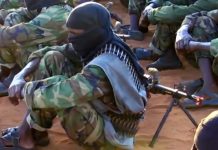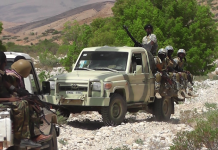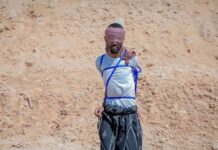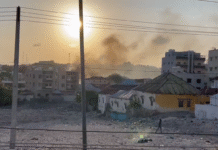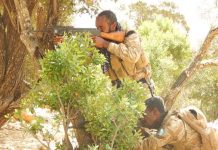The streets start emptying at dusk. “As soon as the sun goes down, the kids come out and take over,” said Abdi Ali. He gestured towards the western end of Queens Crescent, the entrance of Weedington Road, prime turf for the gang that controls this corner of Camden, north London.
There was, until quite recently, a police station nearby that functioned as a community hub. Officers would routinely patrol the neighbourhood, offering reassurance and a reliable stream of intelligence.
But the station closed 18 months ago according to locals and since then the surrounding streets have been commandeered by gangs. Violence, said Ali, had spiralled during the ensuing period.
“Now they are killing each other – it’s been made worse because they’ve started supplying heroin. They don’t even bother with cannabis any more,” said the 32-year-old, who works at his uncle’s grocery store, Banadir Gate.
Ali belongs to the area’s sizeable Somali community, still traumatised by the violent scenes last week that saw two of its younger members killed on Camden’s streets.
Sadiq Adan Mohamed, 20, was stabbed to death on Tuesday evening, 300 metres from Banadir Gate. Less than two hours earlier, Abdikarim Hassan, 17, was found fatally wounded in a nearby street. That followed the stabbing of a 16-year-old, who remains in hospital.
Although an 18-year-old man has been arrested in Camden on suspicion of two counts of murder, a section 60 order remains in place across the borough, allowing officers to stop and search people “with good reason”. Already police have intercepted a number of young men carrying weapons. The police measure, under continual review, remains in place amid fear of reprisal attacks.
Weedington Road had recently become bitterly contested “turf”, according to Ali, with youngsters from Queens Crescent clashing with those from nearby Agar Grove, Chalk Farm and Camden. Congolese teenagers had, he said, teamed up with Irish youngsters to take on the Somalis.
“But the police just drive down here, look around and drive on. Since the police left us it’s been terrible,” said Ali, whose family fled Mogadishu and the country’s civil war in 2003.
Other Somalis describe a “security vacuum” that has left them effectively abandoned by the police and, more broadly, the state. “Kids around here don’t feel safe, the police aren’t doing enough,” said Abshir Mohamed, whose parents also fled the Somali civil war for London in 1988.
“There’s lots of money for Prevent [the government’s counter-radicalisation strategy] and for counter-terrorism which can target the Somali community, but then you have younger members of our community being targeted by knife crime. There’s a sense that Somalis are not being protected.” Mohamed, who is a youth volunteer for the Kentish Town Community Centre, and meets many of the area’s young Somalis, said trust in the police among youngsters had ebbed away. “If a young man gets threatened and he’s told: ‘The next time I see you I’ll stab you’, they don’t tell the police. They just carry a knife. They are not safe.”
Mohamed said that Camden borough’s police commander had held a meeting in the community centre in the aftermath of Tuesday’s stabbings to address security concerns.
“He said they had collected a lot of knives in the area through section 60, but when we asked them why didn’t they do more, he just said [there had been] funding cuts. Every time we ask why they don’t do more patrols around here, they just respond by saying cutbacks [were to blame].”
Ismail Einashe, a journalist born in Somalia who used to live in Camden, said that such distrust was compounded by the sense that not only had the state failed to protect them, but that many felt the justice system too easily criminalised them. “And then you add austerity – cuts in youth services and police numbers – to the mix and you create a really toxic environment.”
Mohamed, who also works as a primary school teacher in the area, said when he was growing up he looked forward to five-a-side football and adventure trips that were arranged to occupy them. “They were the good old days, now they’ve got nothing. There’s nothing for them to do anymore,” he said.
A fear of being stabbed had also prevented many of the neighbourhood’s adults from confronting the youngsters who congregated in the area. Mohamed, 33, said many felt powerless.
“If an adult tries to engage with a youth, they just pull out a knife. I’ve seen that with 10-year-olds. You can’t touch them,” said Mohamed.
A young mother waiting at a local bus stop agreed. “We’ve ended up in a place where the kids have nowhere to go, they end up on the streets and that’s where the problems start,” she said, requesting anonymity as she gripped her young son’s hand.
For Mohamed, a daily witness to the alienation facing many of London’s young British Somalis, there is, however, one silver lining. “Thank God we don’t have [many] guns in the UK.”
Source the guardian

